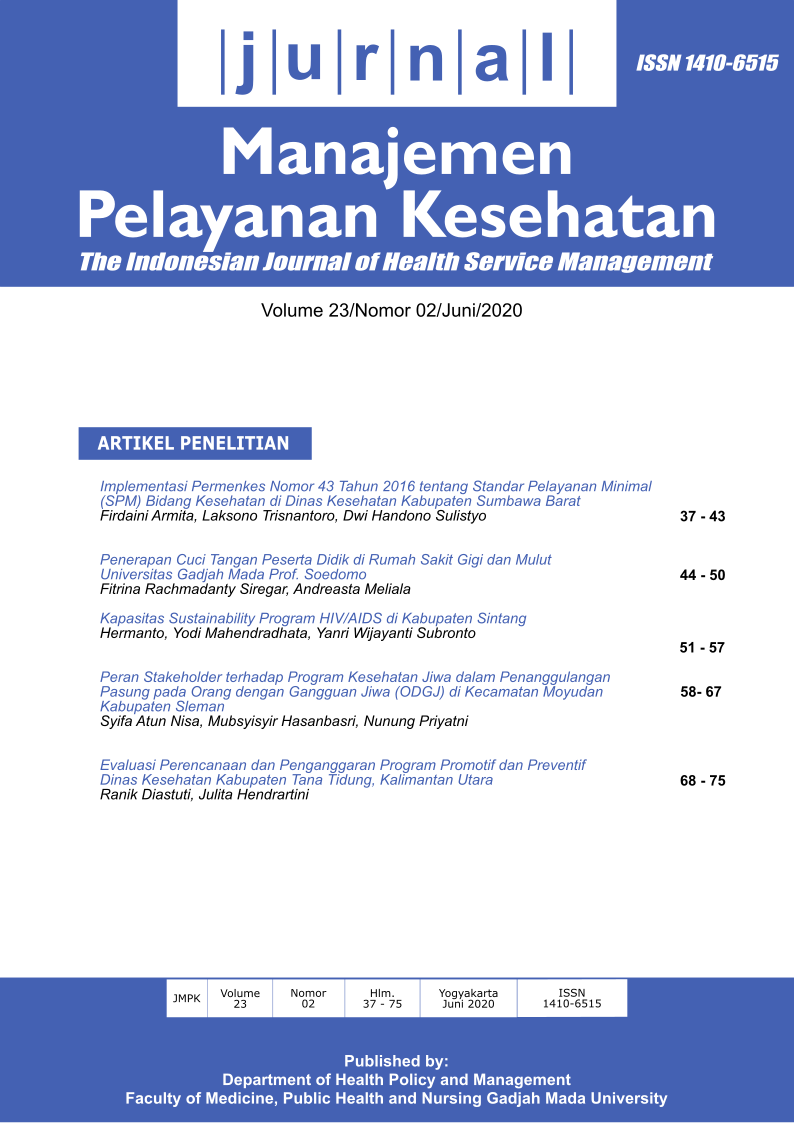KAPASITAS SUSTAINABILITY PROGRAM HIV/AIDS DI KABUPATEN SINTANG
SUSTAINABILITY CAPACITY OF HIV/AIDS PROGRAM IN SINTANG DISTRICT
Abstract
Background: HIV/AIDS sufferers in Sintang Districts recorded the number of new cases from 29 people in 2012 to 63 people in 2017. Funding for the HIV/AIDS program from the Global Fund is uncertain, while funding from the Sintang Regency APBD tends to decrease. These data indicated that the dependence on funding
for the HIV/AIDS program from donors, namely the Global Fund, is large enough that a study on the sustainability of the HIV/AIDS program is required if funding support from donors ceases. This can be a consideration for local governments and managers of the HIV/AIDS program to maintain the sustainability of the HIV/AIDS program to achieve the benefits and objectives to be achieved in the HIV/AIDS prevention program.
Objective: To describe capacity sustainability (funding stability, or ganizational capacity, program evaluation, program adaptation and communication) of HIV/AIDS programs in Sintang District.
Methods: This research used a qualitative approach with descriptive research type. Subjects of this study were 21 people. This research used purposive sampling and snowballing sampling for
People living with HIV/Aids (PLWHA), with data analysis used is content analysis.
Results: The sustainability of HIV/AIDS programs has not been supported by varied funding sources and the ability to obtain funding through the private sector (CSR). Priority setting of the proposed funding program is not evenly distributed, especially on cross-sectoral OPD and lack of NGO independence in terms of funding. Increased availability of health personnel and improvement of facilities at puskesmas to be able to perform HIV / AIDS testing.
Standard evaluation report formats are still not getting attention, not yet supported by the local monitoring and evaluation team as well as some OPD across sectors have not benefited from the evaluation.
weak aspects of prevention of HIV/AIDS transmission and cross sectoral involvement in monitoring. lack of availability of counselors and weak cross-sectoral involvement in communicating programs.
Conclusion: The capacity of funding stability, organizational capacity, program evaluation, program adaptation and communication still require improvement and improvement with priority setting policy and funding through the private sector, support for the role of stakeholders related to the HIV/AIDS program.
Copyright (c) 2020 Hermanto, Yodi Mahendrahata, Yanri Wijayanti Subronto

This work is licensed under a Creative Commons Attribution-NonCommercial-ShareAlike 4.0 International License.




